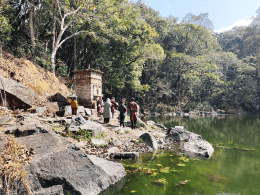Nestled among terraced paddy fields and bordered by a gently winding river, Pachu is quickly gaining recognition as one of Bhutan’s most promising eco-tourism destinations. Located in Phuentsholing gewog, the site has captivated visitors with its immersive rural experiences and breathtaking natural beauty.
Since its launch in November 2024, the community-driven initiative has seen steady growth. According to Nado, the project’s leader, the eco-tourism site experienced its highest footfall during the final two months of 2024, generating over Nu 300,000 in revenue. More than 200 visitors, primarily Bhutanese, flocked to the site during the peak season.
“Many visitors come here to experience and enjoy rural life,” Nado explained. “We offer traditional games such as archery, khuru, and fishing, but the hot stone bath remains the most popular attraction.”
Visitors also have the opportunity to immerse themselves in local culture through cultural performances and farming activities, including paddy cultivation and vegetable farming in the on-site greenhouse. A fully furnished eco-lodge supported by Helvetas Bhutan, equipped with well-maintained tents, ensures a comfortable yet authentic rural experience.
The initiative was founded by seven unemployed youths from the community, though one member later relocated to Thimphu, leaving a dedicated team of six to manage the site’s daily operations. The broader community also plays an integral role, with nine villagers performing cultural dances, two overseeing the hot stone bath, and others assisting with firewood collection and other tasks.
Originally featuring bamboo tents with traditional thatched roofs, the campsite has since upgraded to modern tents, enhancing comfort without compromising the rustic charm. Visitors can enjoy an all-inclusive package priced at Nu 1,200, which covers meals, cultural performances, games, and other facilities.
The project has become a vital source of income for the local community, with benefits extending beyond those directly involved. Roadside businesses and taxi drivers have reported increased customer traffic, while local farmers and businesses supply essential goods, including rice and meat.
However, the initiative faces challenges. The feeder road leading to the site is only accessible by vehicles like Boleros, limiting visitor accessibility. Additionally, Indian tourists are currently restricted from visiting the site beyond the waterfall café due to immigration policies, despite growing interest from across the border following promotional coverage on Indian media channels.
“If Indian tourists were permitted to visit, even just for day trips, it could significantly boost our revenue and help sustain the initiative,” Nado noted.
Despite these hurdles, the future of Pachu’s eco-tourism project looks promising. With continued support from institutions such as the Chukha Dzongkhag Administration, Phuentsholing Drungkhag and Gewog administration, Bhutan Chamber of Commerce and Industry, Department of Agricultural Marketing and Cooperatives, and Helvetas Bhutan, the initiative is poised for further growth.
As Pachu continues to evolve, its success stands as a testament to the power of community-driven tourism, offering both visitors and locals a unique opportunity to connect with Bhutan’s rich cultural heritage and stunning natural landscapes.








